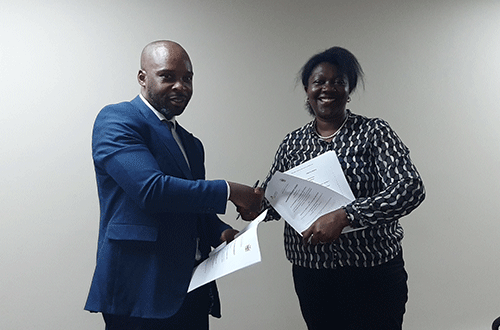SWAKOPMUND – Rural communities and schools, especially those in communal farms and areas that are struggling with unsuitable drinking water, will soon be able to drink potable water.
The government injected N$15 million into a water-softening project that will benefit the whole country.
Government, in partnership with the Environmental Investment Fund, will install mini desalination plants at boreholes throughout the country to make the water drinkable. The plants will by means of reverse osmosis extract the minerals from the water, thus making it safe for both human and animal consumption.
The amount government will spend on the entire country, according to experts, is just a fraction of what it would have spent if it had opted to advertise a tender for the project.
The less costly yet effective method, according to the executive director of the agriculture ministry Ndiyakupi Nghituwamata, will bring needed relief to rural communities all over Namibia.
Speaking during the signing ceremony of the agreement between the two entities that took place yesterday in Swakopmund, Nghituwamata said the government has invested considerable resources in the drilling of boreholes across Namibia.
“Many of these boreholes have been unsuitable for human consumption and in some instances not even suitable for livestock. Thanks to the success of the three Reverse Osmosis Units installed at communal farms Vrede, Goeiegeluk Pos and Santamab Pos 1 in the Spitzkoppe by the EIF, we can now replicate this throughout the country,” she said.
According to the executive director, the government through consultations decided to collaborate with the institution, whereby they would provide expertise and manpower to roll out the project.
“The ministry sought legal advice from the attorney general and clearance was granted to enter into the agreement we signed today. We, as per the agreement, transferred N$15 million to the EIF for purposes of water-softening systems,” the executive director explained.
Revolutionary intervention
Director: Water Supply and Sanitation Coordination in the agriculture ministry Elijah Ngurare explained that the poor water quality in some parts of the country is well known seeing that Namibia is one of the driest countries in the world.
Hence, he said the current softening of water is a revolutionary project as it not only makes water accessible and drinkable but will also minimise human-animal conflict in some areas of the country.
“After the success at Spitzkoppe in the Erongo region, we wanted to replicate this success. We intend to start from the south, the Salt Block area, situated between the //Kharas and Hardap regions, as well as Karasburg and Blouwes. Other areas where we have challenges with underwater are Petrusfontein in the Khorixas area where we got class C water, Kamanjab area. The EIF team already visited the south for samples and moved on to the north for more samples from our boreholes,” he said.
According to him, the pilot projects will be done in 10 regions in collaboration with the decentralised function of the Rural Water Supply and Sanitation Coordination in the Erongo, Hardap, //Kharas, Oshikoto, Kunene, Kavango East, Kavango West, Ohangwena, Omusati and Zambezi.
EIF chief executive officer Benedict Libanda said they are honoured to be part of the project as it also emulates the relationship between the government and EIF.
“The agreement places our relationship on another level and also highlights the importance of water supply in rural areas and sustainable projects, especially in settlements as it supports the livelihoods of Namibians at the grassroots level.”


